Social Science Assignment PDF
VerifiedAdded on 2021/09/13
|10
|2102
|78
AI Summary
Contribute Materials
Your contribution can guide someone’s learning journey. Share your
documents today.
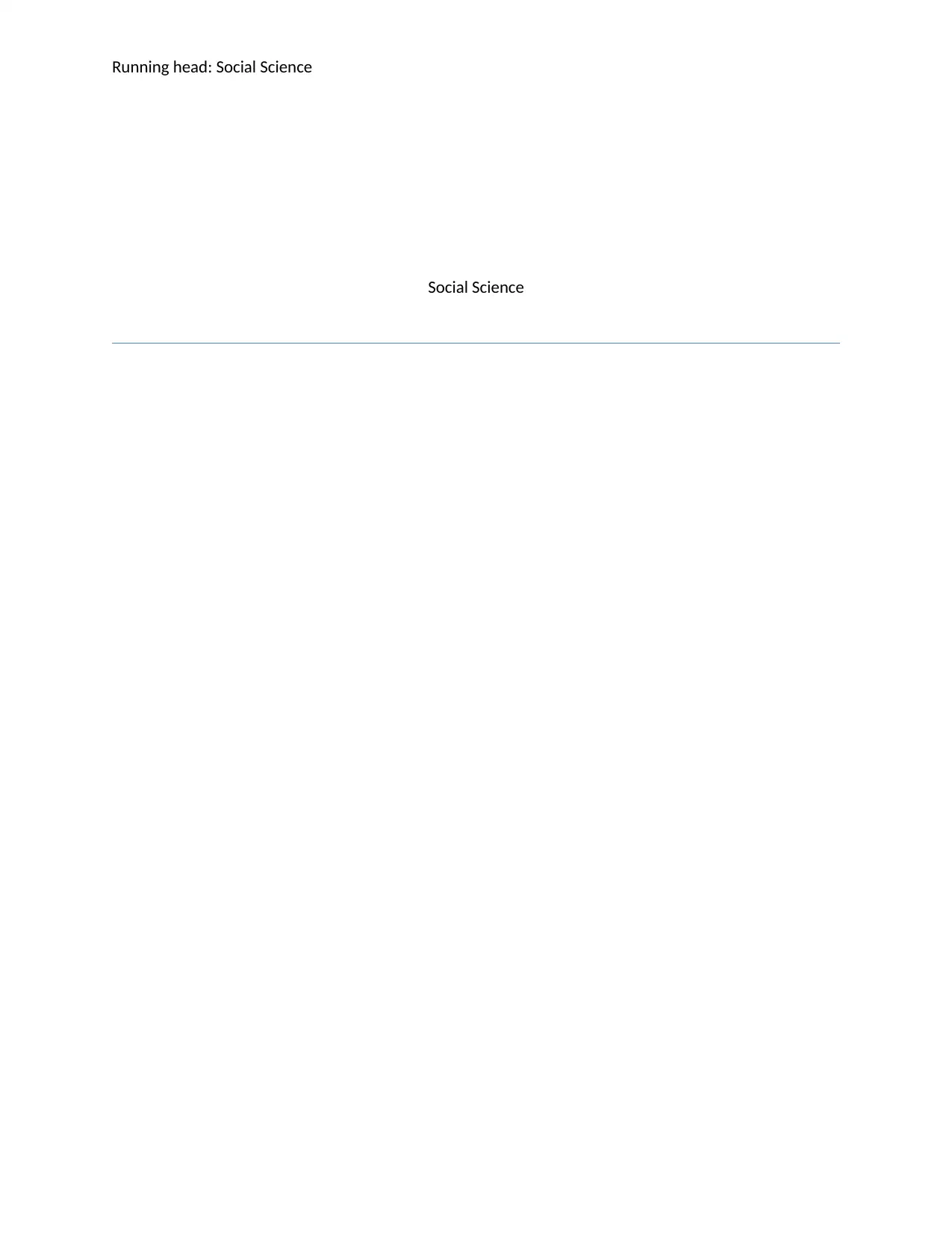
Running head: Social Science
Social Science
Social Science
Secure Best Marks with AI Grader
Need help grading? Try our AI Grader for instant feedback on your assignments.
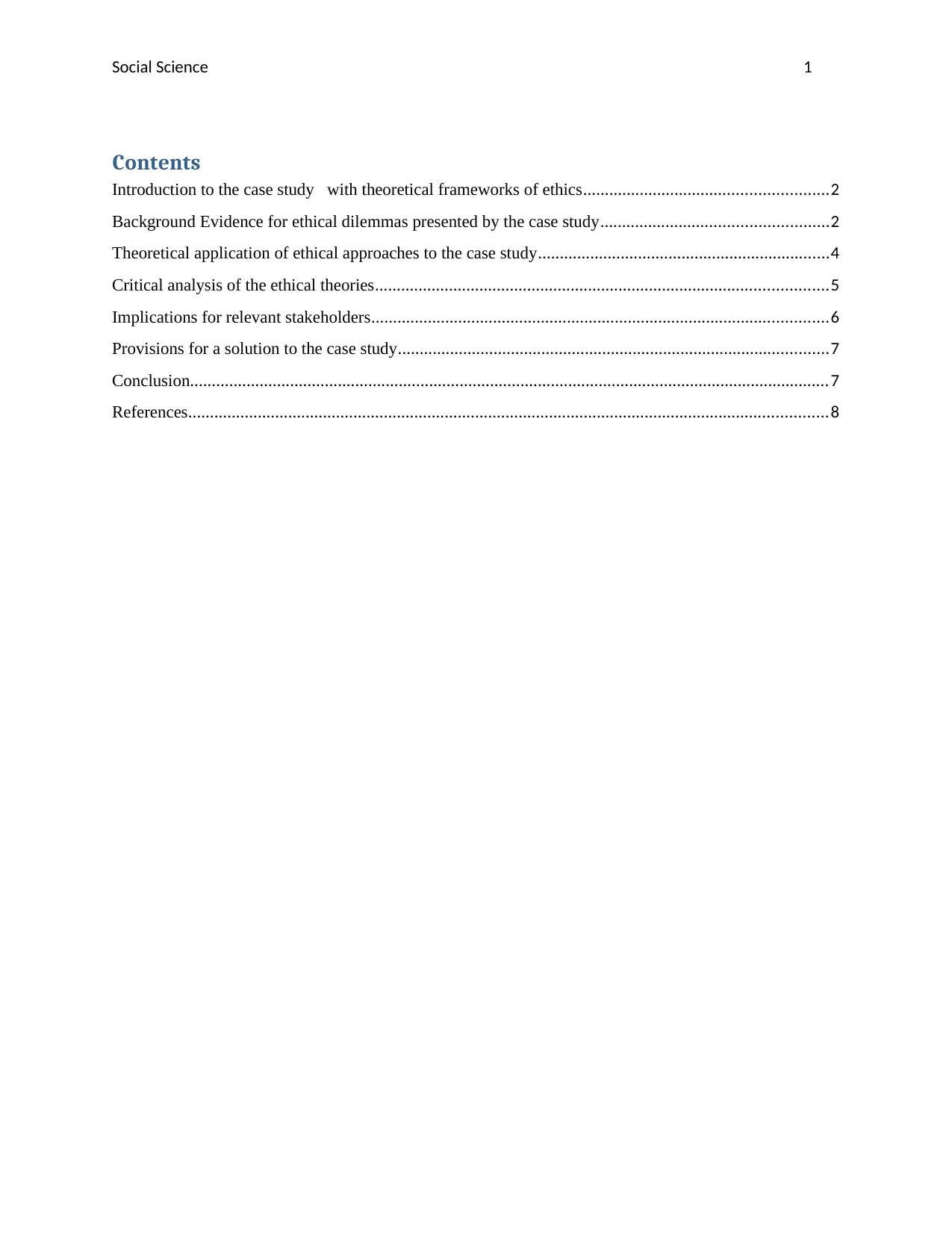
Social Science 1
Contents
Introduction to the case study with theoretical frameworks of ethics........................................................2
Background Evidence for ethical dilemmas presented by the case study....................................................2
Theoretical application of ethical approaches to the case study...................................................................4
Critical analysis of the ethical theories........................................................................................................5
Implications for relevant stakeholders.........................................................................................................6
Provisions for a solution to the case study...................................................................................................7
Conclusion...................................................................................................................................................7
References...................................................................................................................................................8
Contents
Introduction to the case study with theoretical frameworks of ethics........................................................2
Background Evidence for ethical dilemmas presented by the case study....................................................2
Theoretical application of ethical approaches to the case study...................................................................4
Critical analysis of the ethical theories........................................................................................................5
Implications for relevant stakeholders.........................................................................................................6
Provisions for a solution to the case study...................................................................................................7
Conclusion...................................................................................................................................................7
References...................................................................................................................................................8
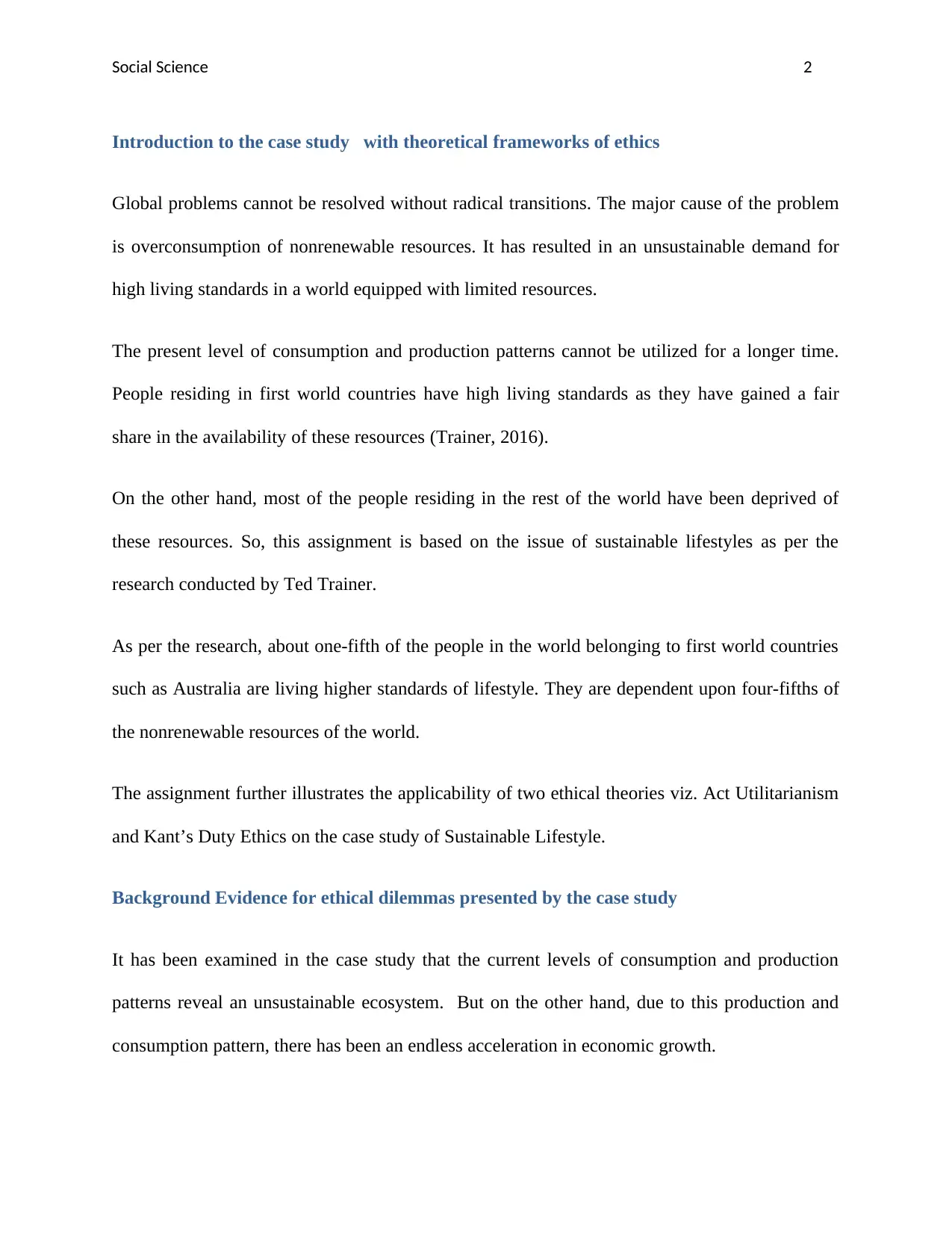
Social Science 2
Introduction to the case study with theoretical frameworks of ethics
Global problems cannot be resolved without radical transitions. The major cause of the problem
is overconsumption of nonrenewable resources. It has resulted in an unsustainable demand for
high living standards in a world equipped with limited resources.
The present level of consumption and production patterns cannot be utilized for a longer time.
People residing in first world countries have high living standards as they have gained a fair
share in the availability of these resources (Trainer, 2016).
On the other hand, most of the people residing in the rest of the world have been deprived of
these resources. So, this assignment is based on the issue of sustainable lifestyles as per the
research conducted by Ted Trainer.
As per the research, about one-fifth of the people in the world belonging to first world countries
such as Australia are living higher standards of lifestyle. They are dependent upon four-fifths of
the nonrenewable resources of the world.
The assignment further illustrates the applicability of two ethical theories viz. Act Utilitarianism
and Kant’s Duty Ethics on the case study of Sustainable Lifestyle.
Background Evidence for ethical dilemmas presented by the case study
It has been examined in the case study that the current levels of consumption and production
patterns reveal an unsustainable ecosystem. But on the other hand, due to this production and
consumption pattern, there has been an endless acceleration in economic growth.
Introduction to the case study with theoretical frameworks of ethics
Global problems cannot be resolved without radical transitions. The major cause of the problem
is overconsumption of nonrenewable resources. It has resulted in an unsustainable demand for
high living standards in a world equipped with limited resources.
The present level of consumption and production patterns cannot be utilized for a longer time.
People residing in first world countries have high living standards as they have gained a fair
share in the availability of these resources (Trainer, 2016).
On the other hand, most of the people residing in the rest of the world have been deprived of
these resources. So, this assignment is based on the issue of sustainable lifestyles as per the
research conducted by Ted Trainer.
As per the research, about one-fifth of the people in the world belonging to first world countries
such as Australia are living higher standards of lifestyle. They are dependent upon four-fifths of
the nonrenewable resources of the world.
The assignment further illustrates the applicability of two ethical theories viz. Act Utilitarianism
and Kant’s Duty Ethics on the case study of Sustainable Lifestyle.
Background Evidence for ethical dilemmas presented by the case study
It has been examined in the case study that the current levels of consumption and production
patterns reveal an unsustainable ecosystem. But on the other hand, due to this production and
consumption pattern, there has been an endless acceleration in economic growth.
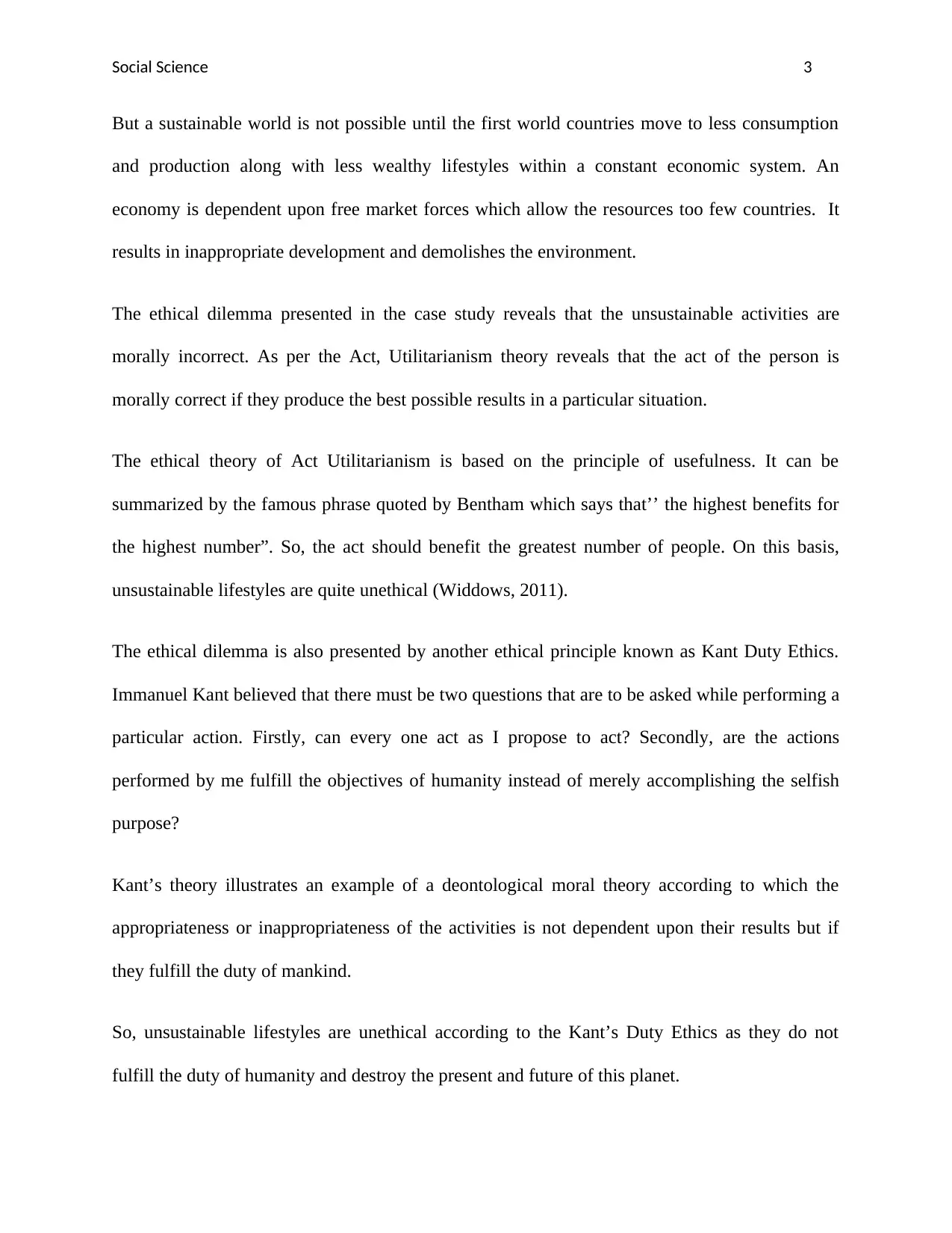
Social Science 3
But a sustainable world is not possible until the first world countries move to less consumption
and production along with less wealthy lifestyles within a constant economic system. An
economy is dependent upon free market forces which allow the resources too few countries. It
results in inappropriate development and demolishes the environment.
The ethical dilemma presented in the case study reveals that the unsustainable activities are
morally incorrect. As per the Act, Utilitarianism theory reveals that the act of the person is
morally correct if they produce the best possible results in a particular situation.
The ethical theory of Act Utilitarianism is based on the principle of usefulness. It can be
summarized by the famous phrase quoted by Bentham which says that’’ the highest benefits for
the highest number”. So, the act should benefit the greatest number of people. On this basis,
unsustainable lifestyles are quite unethical (Widdows, 2011).
The ethical dilemma is also presented by another ethical principle known as Kant Duty Ethics.
Immanuel Kant believed that there must be two questions that are to be asked while performing a
particular action. Firstly, can every one act as I propose to act? Secondly, are the actions
performed by me fulfill the objectives of humanity instead of merely accomplishing the selfish
purpose?
Kant’s theory illustrates an example of a deontological moral theory according to which the
appropriateness or inappropriateness of the activities is not dependent upon their results but if
they fulfill the duty of mankind.
So, unsustainable lifestyles are unethical according to the Kant’s Duty Ethics as they do not
fulfill the duty of humanity and destroy the present and future of this planet.
But a sustainable world is not possible until the first world countries move to less consumption
and production along with less wealthy lifestyles within a constant economic system. An
economy is dependent upon free market forces which allow the resources too few countries. It
results in inappropriate development and demolishes the environment.
The ethical dilemma presented in the case study reveals that the unsustainable activities are
morally incorrect. As per the Act, Utilitarianism theory reveals that the act of the person is
morally correct if they produce the best possible results in a particular situation.
The ethical theory of Act Utilitarianism is based on the principle of usefulness. It can be
summarized by the famous phrase quoted by Bentham which says that’’ the highest benefits for
the highest number”. So, the act should benefit the greatest number of people. On this basis,
unsustainable lifestyles are quite unethical (Widdows, 2011).
The ethical dilemma is also presented by another ethical principle known as Kant Duty Ethics.
Immanuel Kant believed that there must be two questions that are to be asked while performing a
particular action. Firstly, can every one act as I propose to act? Secondly, are the actions
performed by me fulfill the objectives of humanity instead of merely accomplishing the selfish
purpose?
Kant’s theory illustrates an example of a deontological moral theory according to which the
appropriateness or inappropriateness of the activities is not dependent upon their results but if
they fulfill the duty of mankind.
So, unsustainable lifestyles are unethical according to the Kant’s Duty Ethics as they do not
fulfill the duty of humanity and destroy the present and future of this planet.
Secure Best Marks with AI Grader
Need help grading? Try our AI Grader for instant feedback on your assignments.
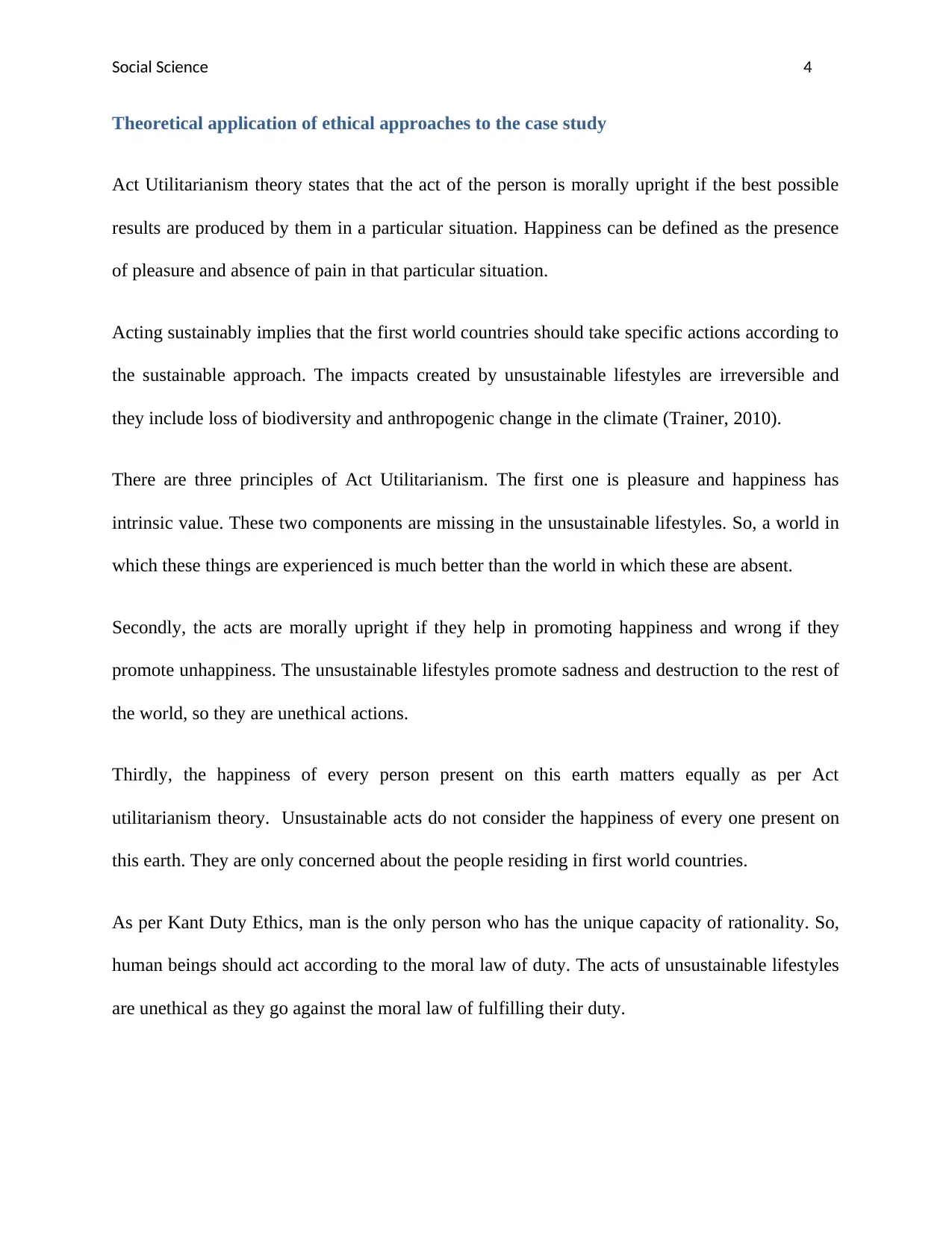
Social Science 4
Theoretical application of ethical approaches to the case study
Act Utilitarianism theory states that the act of the person is morally upright if the best possible
results are produced by them in a particular situation. Happiness can be defined as the presence
of pleasure and absence of pain in that particular situation.
Acting sustainably implies that the first world countries should take specific actions according to
the sustainable approach. The impacts created by unsustainable lifestyles are irreversible and
they include loss of biodiversity and anthropogenic change in the climate (Trainer, 2010).
There are three principles of Act Utilitarianism. The first one is pleasure and happiness has
intrinsic value. These two components are missing in the unsustainable lifestyles. So, a world in
which these things are experienced is much better than the world in which these are absent.
Secondly, the acts are morally upright if they help in promoting happiness and wrong if they
promote unhappiness. The unsustainable lifestyles promote sadness and destruction to the rest of
the world, so they are unethical actions.
Thirdly, the happiness of every person present on this earth matters equally as per Act
utilitarianism theory. Unsustainable acts do not consider the happiness of every one present on
this earth. They are only concerned about the people residing in first world countries.
As per Kant Duty Ethics, man is the only person who has the unique capacity of rationality. So,
human beings should act according to the moral law of duty. The acts of unsustainable lifestyles
are unethical as they go against the moral law of fulfilling their duty.
Theoretical application of ethical approaches to the case study
Act Utilitarianism theory states that the act of the person is morally upright if the best possible
results are produced by them in a particular situation. Happiness can be defined as the presence
of pleasure and absence of pain in that particular situation.
Acting sustainably implies that the first world countries should take specific actions according to
the sustainable approach. The impacts created by unsustainable lifestyles are irreversible and
they include loss of biodiversity and anthropogenic change in the climate (Trainer, 2010).
There are three principles of Act Utilitarianism. The first one is pleasure and happiness has
intrinsic value. These two components are missing in the unsustainable lifestyles. So, a world in
which these things are experienced is much better than the world in which these are absent.
Secondly, the acts are morally upright if they help in promoting happiness and wrong if they
promote unhappiness. The unsustainable lifestyles promote sadness and destruction to the rest of
the world, so they are unethical actions.
Thirdly, the happiness of every person present on this earth matters equally as per Act
utilitarianism theory. Unsustainable acts do not consider the happiness of every one present on
this earth. They are only concerned about the people residing in first world countries.
As per Kant Duty Ethics, man is the only person who has the unique capacity of rationality. So,
human beings should act according to the moral law of duty. The acts of unsustainable lifestyles
are unethical as they go against the moral law of fulfilling their duty.
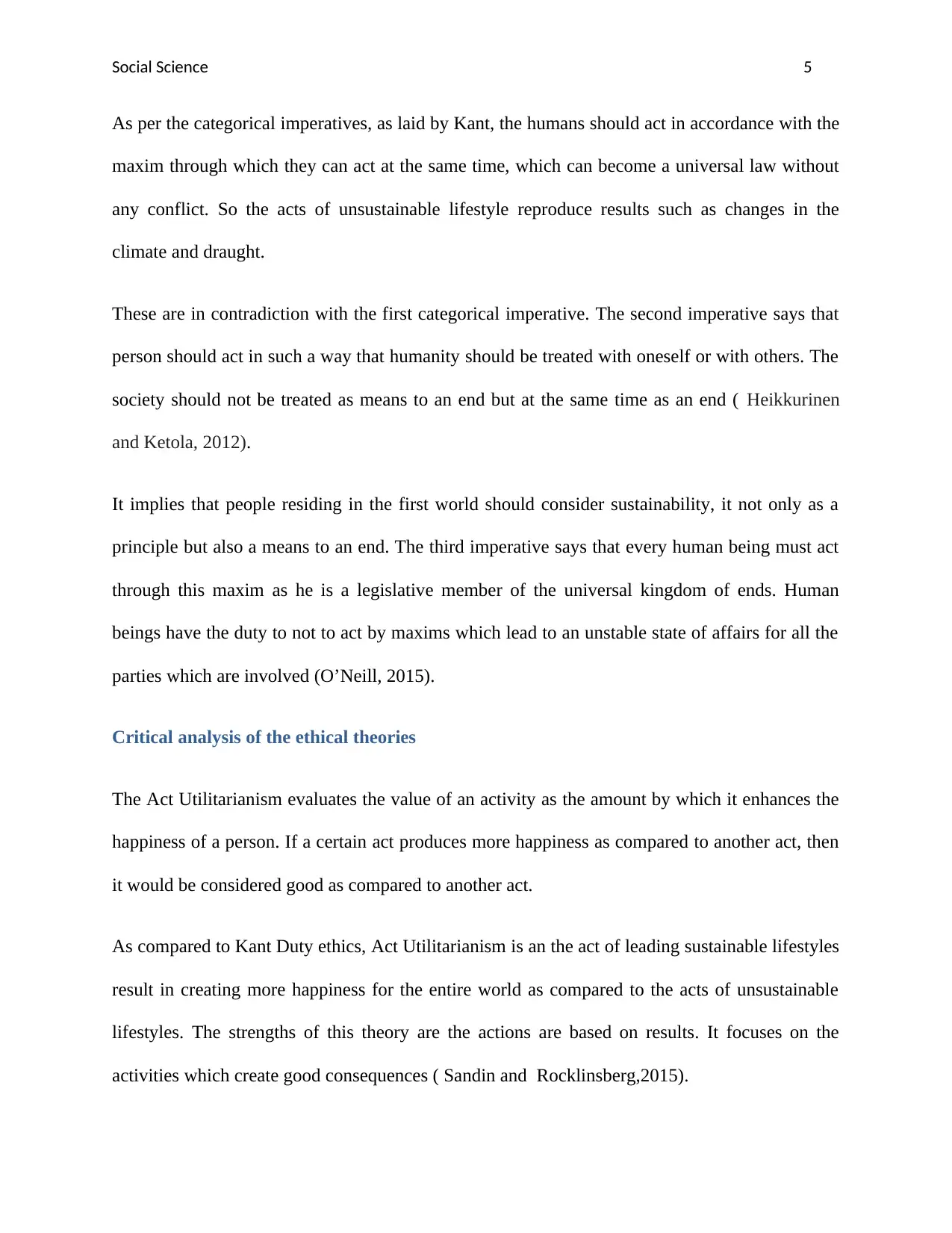
Social Science 5
As per the categorical imperatives, as laid by Kant, the humans should act in accordance with the
maxim through which they can act at the same time, which can become a universal law without
any conflict. So the acts of unsustainable lifestyle reproduce results such as changes in the
climate and draught.
These are in contradiction with the first categorical imperative. The second imperative says that
person should act in such a way that humanity should be treated with oneself or with others. The
society should not be treated as means to an end but at the same time as an end ( Heikkurinen
and Ketola, 2012).
It implies that people residing in the first world should consider sustainability, it not only as a
principle but also a means to an end. The third imperative says that every human being must act
through this maxim as he is a legislative member of the universal kingdom of ends. Human
beings have the duty to not to act by maxims which lead to an unstable state of affairs for all the
parties which are involved (O’Neill, 2015).
Critical analysis of the ethical theories
The Act Utilitarianism evaluates the value of an activity as the amount by which it enhances the
happiness of a person. If a certain act produces more happiness as compared to another act, then
it would be considered good as compared to another act.
As compared to Kant Duty ethics, Act Utilitarianism is an the act of leading sustainable lifestyles
result in creating more happiness for the entire world as compared to the acts of unsustainable
lifestyles. The strengths of this theory are the actions are based on results. It focuses on the
activities which create good consequences ( Sandin and Rocklinsberg,2015).
As per the categorical imperatives, as laid by Kant, the humans should act in accordance with the
maxim through which they can act at the same time, which can become a universal law without
any conflict. So the acts of unsustainable lifestyle reproduce results such as changes in the
climate and draught.
These are in contradiction with the first categorical imperative. The second imperative says that
person should act in such a way that humanity should be treated with oneself or with others. The
society should not be treated as means to an end but at the same time as an end ( Heikkurinen
and Ketola, 2012).
It implies that people residing in the first world should consider sustainability, it not only as a
principle but also a means to an end. The third imperative says that every human being must act
through this maxim as he is a legislative member of the universal kingdom of ends. Human
beings have the duty to not to act by maxims which lead to an unstable state of affairs for all the
parties which are involved (O’Neill, 2015).
Critical analysis of the ethical theories
The Act Utilitarianism evaluates the value of an activity as the amount by which it enhances the
happiness of a person. If a certain act produces more happiness as compared to another act, then
it would be considered good as compared to another act.
As compared to Kant Duty ethics, Act Utilitarianism is an the act of leading sustainable lifestyles
result in creating more happiness for the entire world as compared to the acts of unsustainable
lifestyles. The strengths of this theory are the actions are based on results. It focuses on the
activities which create good consequences ( Sandin and Rocklinsberg,2015).
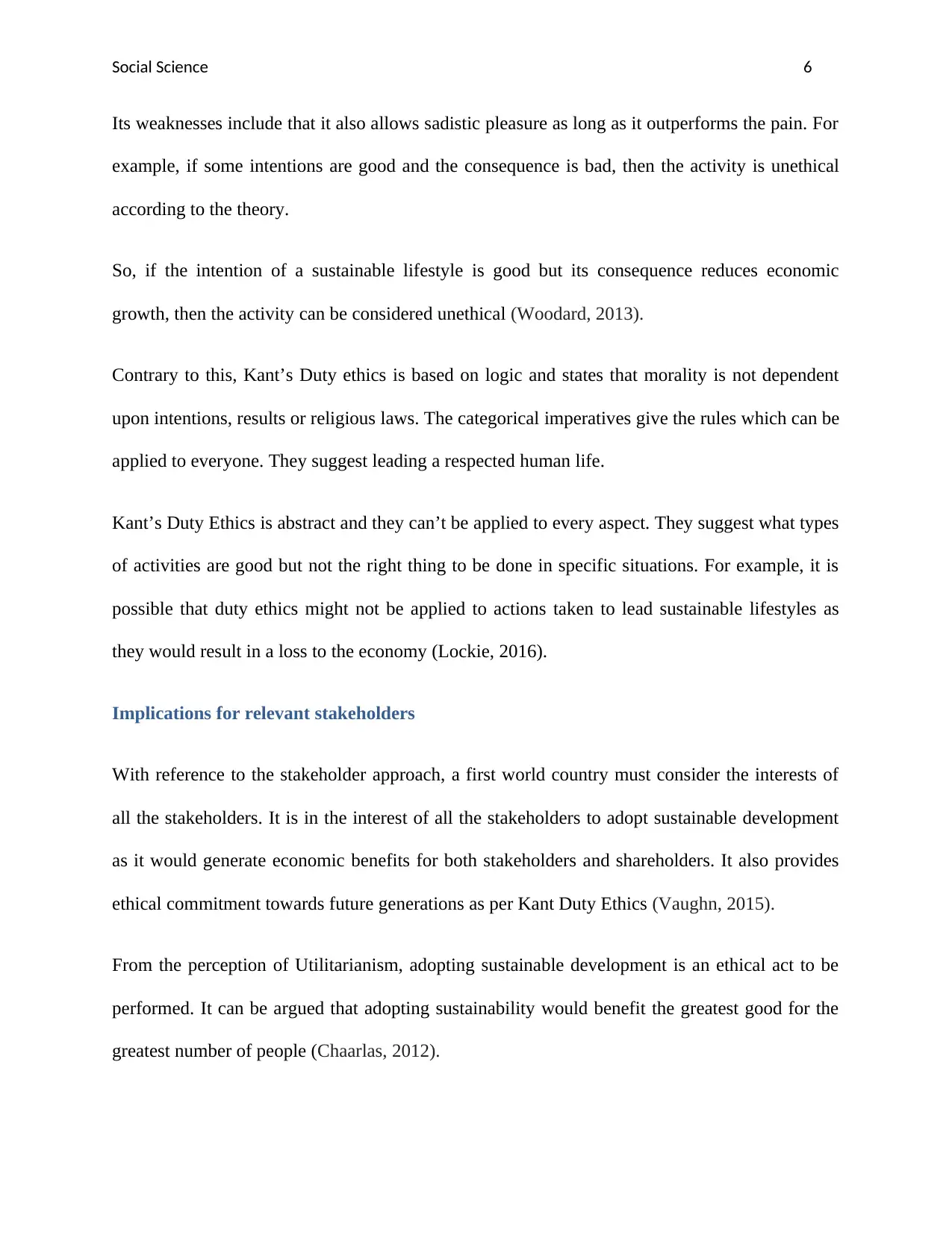
Social Science 6
Its weaknesses include that it also allows sadistic pleasure as long as it outperforms the pain. For
example, if some intentions are good and the consequence is bad, then the activity is unethical
according to the theory.
So, if the intention of a sustainable lifestyle is good but its consequence reduces economic
growth, then the activity can be considered unethical (Woodard, 2013).
Contrary to this, Kant’s Duty ethics is based on logic and states that morality is not dependent
upon intentions, results or religious laws. The categorical imperatives give the rules which can be
applied to everyone. They suggest leading a respected human life.
Kant’s Duty Ethics is abstract and they can’t be applied to every aspect. They suggest what types
of activities are good but not the right thing to be done in specific situations. For example, it is
possible that duty ethics might not be applied to actions taken to lead sustainable lifestyles as
they would result in a loss to the economy (Lockie, 2016).
Implications for relevant stakeholders
With reference to the stakeholder approach, a first world country must consider the interests of
all the stakeholders. It is in the interest of all the stakeholders to adopt sustainable development
as it would generate economic benefits for both stakeholders and shareholders. It also provides
ethical commitment towards future generations as per Kant Duty Ethics (Vaughn, 2015).
From the perception of Utilitarianism, adopting sustainable development is an ethical act to be
performed. It can be argued that adopting sustainability would benefit the greatest good for the
greatest number of people (Chaarlas, 2012).
Its weaknesses include that it also allows sadistic pleasure as long as it outperforms the pain. For
example, if some intentions are good and the consequence is bad, then the activity is unethical
according to the theory.
So, if the intention of a sustainable lifestyle is good but its consequence reduces economic
growth, then the activity can be considered unethical (Woodard, 2013).
Contrary to this, Kant’s Duty ethics is based on logic and states that morality is not dependent
upon intentions, results or religious laws. The categorical imperatives give the rules which can be
applied to everyone. They suggest leading a respected human life.
Kant’s Duty Ethics is abstract and they can’t be applied to every aspect. They suggest what types
of activities are good but not the right thing to be done in specific situations. For example, it is
possible that duty ethics might not be applied to actions taken to lead sustainable lifestyles as
they would result in a loss to the economy (Lockie, 2016).
Implications for relevant stakeholders
With reference to the stakeholder approach, a first world country must consider the interests of
all the stakeholders. It is in the interest of all the stakeholders to adopt sustainable development
as it would generate economic benefits for both stakeholders and shareholders. It also provides
ethical commitment towards future generations as per Kant Duty Ethics (Vaughn, 2015).
From the perception of Utilitarianism, adopting sustainable development is an ethical act to be
performed. It can be argued that adopting sustainability would benefit the greatest good for the
greatest number of people (Chaarlas, 2012).
Paraphrase This Document
Need a fresh take? Get an instant paraphrase of this document with our AI Paraphraser
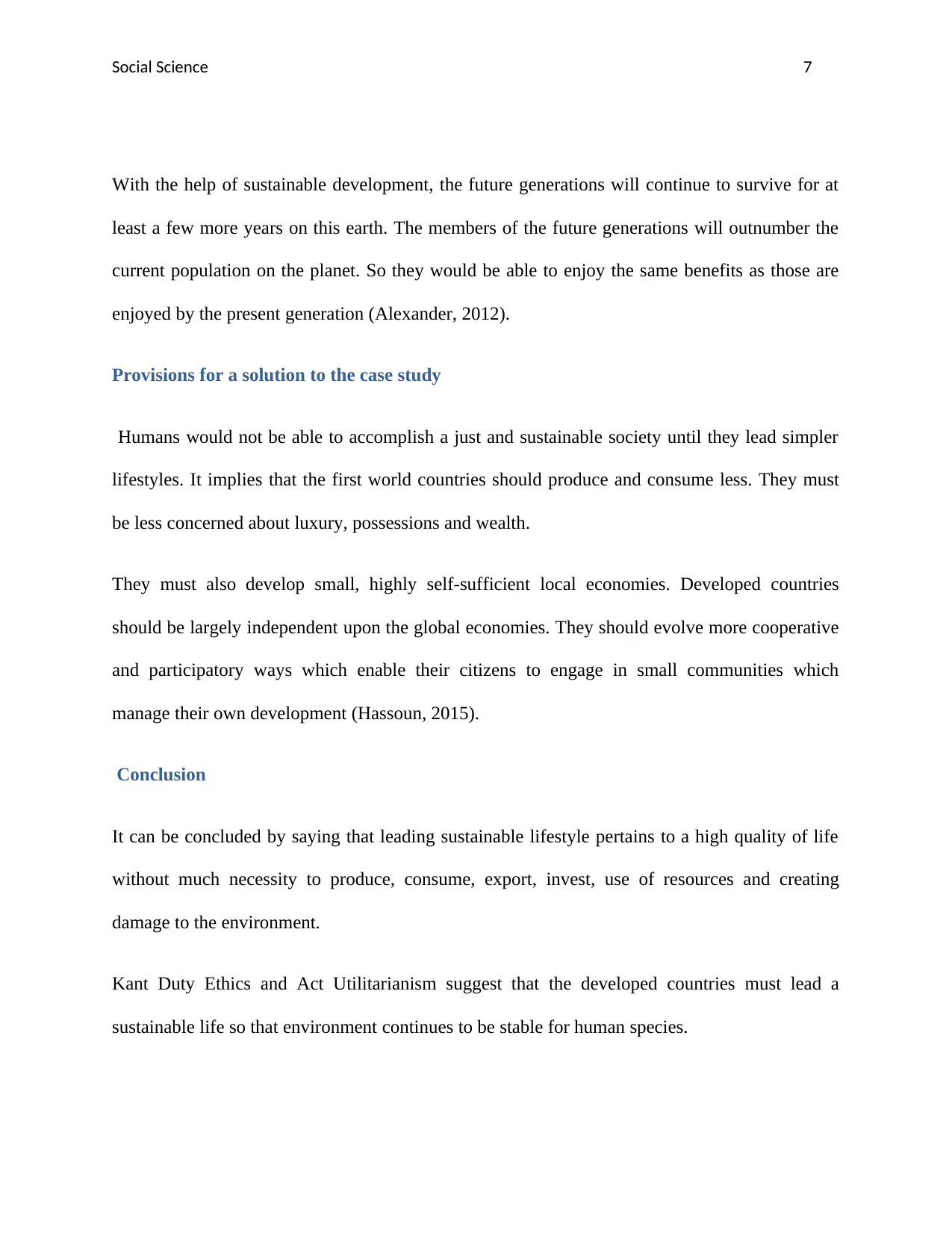
Social Science 7
With the help of sustainable development, the future generations will continue to survive for at
least a few more years on this earth. The members of the future generations will outnumber the
current population on the planet. So they would be able to enjoy the same benefits as those are
enjoyed by the present generation (Alexander, 2012).
Provisions for a solution to the case study
Humans would not be able to accomplish a just and sustainable society until they lead simpler
lifestyles. It implies that the first world countries should produce and consume less. They must
be less concerned about luxury, possessions and wealth.
They must also develop small, highly self-sufficient local economies. Developed countries
should be largely independent upon the global economies. They should evolve more cooperative
and participatory ways which enable their citizens to engage in small communities which
manage their own development (Hassoun, 2015).
Conclusion
It can be concluded by saying that leading sustainable lifestyle pertains to a high quality of life
without much necessity to produce, consume, export, invest, use of resources and creating
damage to the environment.
Kant Duty Ethics and Act Utilitarianism suggest that the developed countries must lead a
sustainable life so that environment continues to be stable for human species.
With the help of sustainable development, the future generations will continue to survive for at
least a few more years on this earth. The members of the future generations will outnumber the
current population on the planet. So they would be able to enjoy the same benefits as those are
enjoyed by the present generation (Alexander, 2012).
Provisions for a solution to the case study
Humans would not be able to accomplish a just and sustainable society until they lead simpler
lifestyles. It implies that the first world countries should produce and consume less. They must
be less concerned about luxury, possessions and wealth.
They must also develop small, highly self-sufficient local economies. Developed countries
should be largely independent upon the global economies. They should evolve more cooperative
and participatory ways which enable their citizens to engage in small communities which
manage their own development (Hassoun, 2015).
Conclusion
It can be concluded by saying that leading sustainable lifestyle pertains to a high quality of life
without much necessity to produce, consume, export, invest, use of resources and creating
damage to the environment.
Kant Duty Ethics and Act Utilitarianism suggest that the developed countries must lead a
sustainable life so that environment continues to be stable for human species.
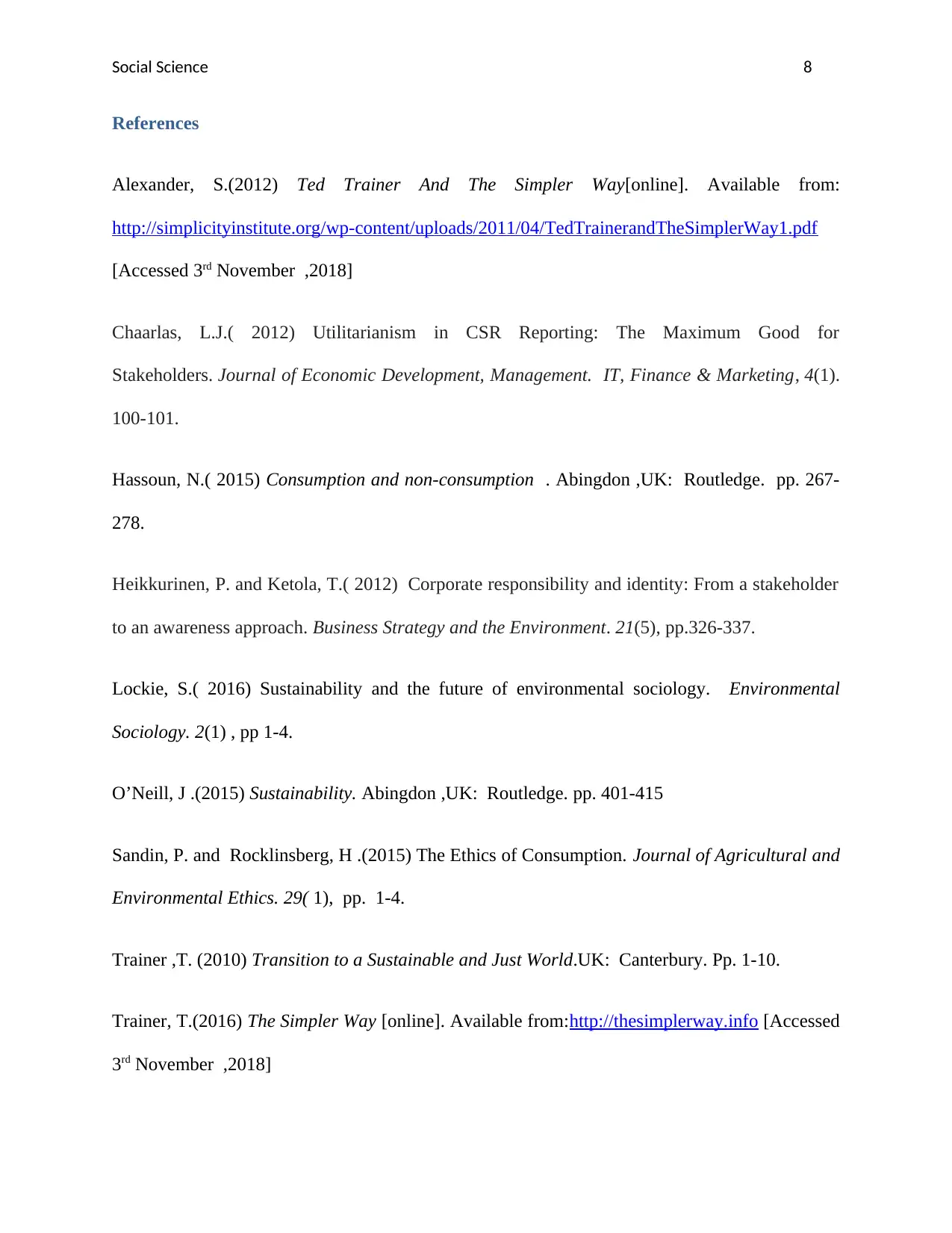
Social Science 8
References
Alexander, S.(2012) Ted Trainer And The Simpler Way[online]. Available from:
http://simplicityinstitute.org/wp-content/uploads/2011/04/TedTrainerandTheSimplerWay1.pdf
[Accessed 3rd November ,2018]
Chaarlas, L.J.( 2012) Utilitarianism in CSR Reporting: The Maximum Good for
Stakeholders. Journal of Economic Development, Management. IT, Finance & Marketing, 4(1).
100-101.
Hassoun, N.( 2015) Consumption and non-consumption . Abingdon ,UK: Routledge. pp. 267-
278.
Heikkurinen, P. and Ketola, T.( 2012) Corporate responsibility and identity: From a stakeholder
to an awareness approach. Business Strategy and the Environment. 21(5), pp.326-337.
Lockie, S.( 2016) Sustainability and the future of environmental sociology. Environmental
Sociology. 2(1) , pp 1-4.
O’Neill, J .(2015) Sustainability. Abingdon ,UK: Routledge. pp. 401-415
Sandin, P. and Rocklinsberg, H .(2015) The Ethics of Consumption. Journal of Agricultural and
Environmental Ethics. 29( 1), pp. 1-4.
Trainer ,T. (2010) Transition to a Sustainable and Just World.UK: Canterbury. Pp. 1-10.
Trainer, T.(2016) The Simpler Way [online]. Available from:http://thesimplerway.info [Accessed
3rd November ,2018]
References
Alexander, S.(2012) Ted Trainer And The Simpler Way[online]. Available from:
http://simplicityinstitute.org/wp-content/uploads/2011/04/TedTrainerandTheSimplerWay1.pdf
[Accessed 3rd November ,2018]
Chaarlas, L.J.( 2012) Utilitarianism in CSR Reporting: The Maximum Good for
Stakeholders. Journal of Economic Development, Management. IT, Finance & Marketing, 4(1).
100-101.
Hassoun, N.( 2015) Consumption and non-consumption . Abingdon ,UK: Routledge. pp. 267-
278.
Heikkurinen, P. and Ketola, T.( 2012) Corporate responsibility and identity: From a stakeholder
to an awareness approach. Business Strategy and the Environment. 21(5), pp.326-337.
Lockie, S.( 2016) Sustainability and the future of environmental sociology. Environmental
Sociology. 2(1) , pp 1-4.
O’Neill, J .(2015) Sustainability. Abingdon ,UK: Routledge. pp. 401-415
Sandin, P. and Rocklinsberg, H .(2015) The Ethics of Consumption. Journal of Agricultural and
Environmental Ethics. 29( 1), pp. 1-4.
Trainer ,T. (2010) Transition to a Sustainable and Just World.UK: Canterbury. Pp. 1-10.
Trainer, T.(2016) The Simpler Way [online]. Available from:http://thesimplerway.info [Accessed
3rd November ,2018]
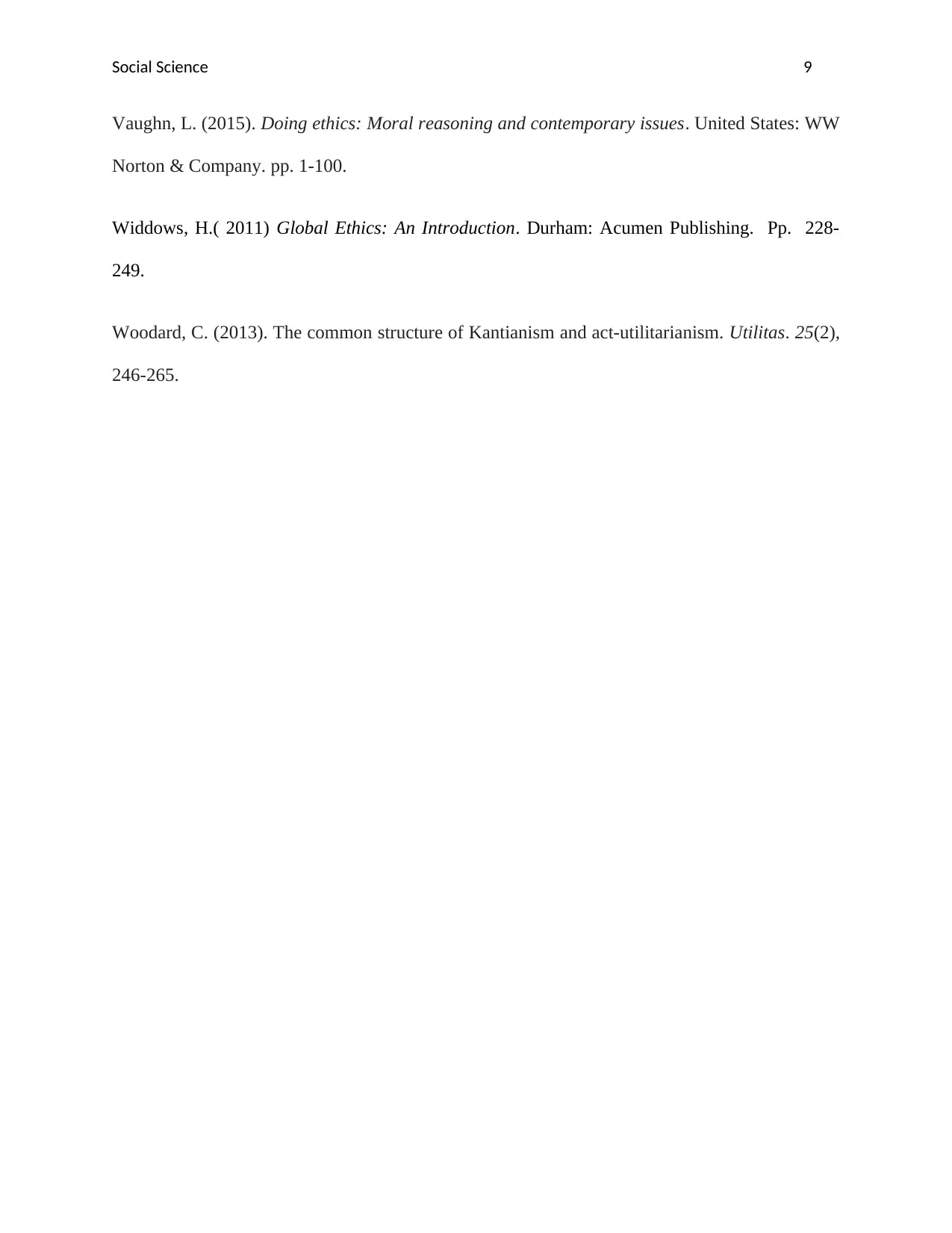
Social Science 9
Vaughn, L. (2015). Doing ethics: Moral reasoning and contemporary issues. United States: WW
Norton & Company. pp. 1-100.
Widdows, H.( 2011) Global Ethics: An Introduction. Durham: Acumen Publishing. Pp. 228-
249.
Woodard, C. (2013). The common structure of Kantianism and act-utilitarianism. Utilitas. 25(2),
246-265.
Vaughn, L. (2015). Doing ethics: Moral reasoning and contemporary issues. United States: WW
Norton & Company. pp. 1-100.
Widdows, H.( 2011) Global Ethics: An Introduction. Durham: Acumen Publishing. Pp. 228-
249.
Woodard, C. (2013). The common structure of Kantianism and act-utilitarianism. Utilitas. 25(2),
246-265.
1 out of 10
Your All-in-One AI-Powered Toolkit for Academic Success.
+13062052269
info@desklib.com
Available 24*7 on WhatsApp / Email
![[object Object]](/_next/static/media/star-bottom.7253800d.svg)
Unlock your academic potential
© 2024 | Zucol Services PVT LTD | All rights reserved.